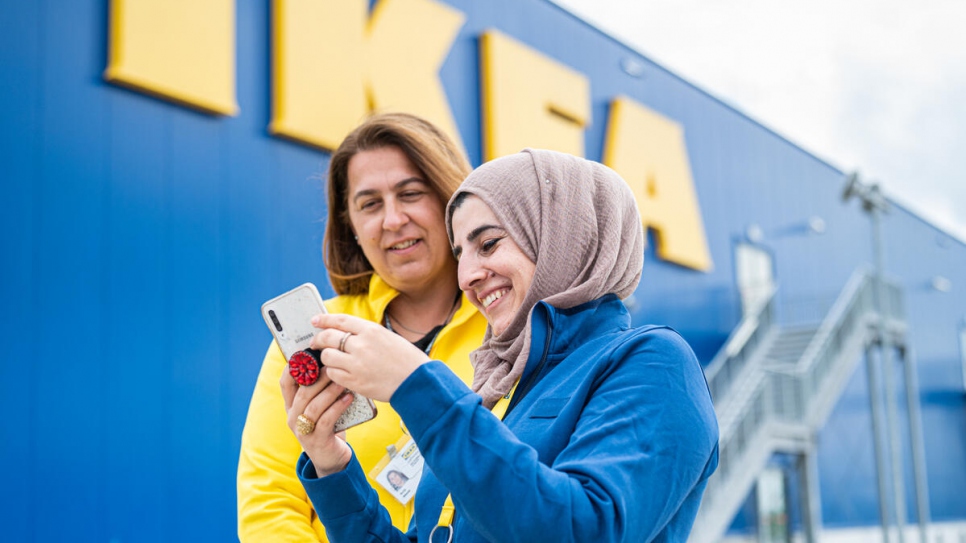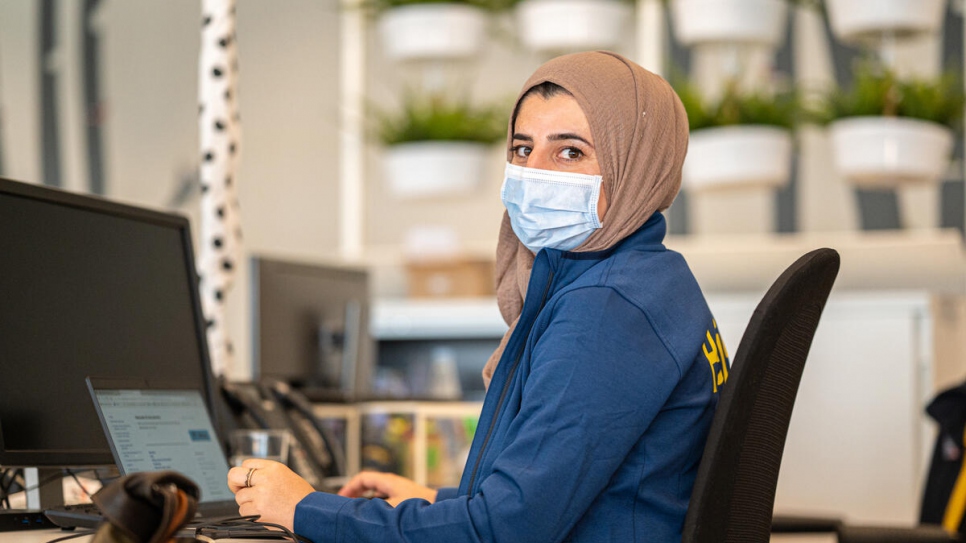Internship a dream come true for refugee at IKEA store in Croatia
Furniture retailer IKEA offers promise of a new start for refugees in Croatia through internship programme under a partnership with UNHCR.
Lajan, 32, stands outside the IKEA Zagreb store. She is one of 15 refugee interns at the store.
© UNHCR/Sanjin Kaštelan
Some people view their office jobs as a daily grind but for Lajan, a refugee from the Kurdistan region of Iraq, the chance of a permanent office job in her new home in Croatia would be a dream come true.
Before she fled Iraq in 2016, Lajan, 32, worked in the accounts department at a bank. Five years of upheaval followed. She and her husband settled in Croatia but lived for two years in a reception centre for asylum-seekers as they waited for their claim to be processed.
“It was a really hard time,” she said.
She cried with happiness when her lawyer called in 2019 to say they had been granted asylum and was left sleepless with excitement when, a few weeks later, the couple finally moved into their own apartment in the capital Zagreb with their two boys who are now nine and three years old.
After that, her attention turned to finding a job. She considered trying to get work as a cleaner, or in a bakery since she loved to cook. But then she was asked by the Red Cross, a UNHCR partner in Croatia, if she was interested in doing a paid internship at the IKEA furniture store in the capital.
"I could not believe it."
She applied, was interviewed and eventually offered an internship for three months in the store’s online customer support department.
“I could not believe it. I called my mum and I said: ‘Look mum, I’m working at the same kind of position that I had in Iraq!’ I was crying and she was crying too,” she said. “It was like a dream come true.”
Lajan got the internship as part of a global initiative led by the Swedish furniture giant with support from UNHCR, the UN Refugee Agency, and other partners to improve the livelihoods of people forced to flee their homes.
UNHCR has partnered with IKEA in Croatia since 2015. This year IKEA has refurbished a reception centre for unaccompanied and separated children who have arrived in Croatia and the company has also donated a variety of items they usually sell to help 500 refugees mitigate the health and economic impacts of the COVID-19 pandemic.
IKEA in Croatia has employed seven refugees, while 15 others – half of them women, including Lajan – are doing three-month internships.
Few realize just how extraordinary many of their personal stories are, or how far they have come to get these positions.
"We are really proud here."
“We are really proud here at IKEA Croatia because our coworkers and our colleagues … started engaging with the refugees and we are one community and that should be the real power of what we do,” said Nikolaos Migkianis, the head of IKEA Croatia.
UNHCR’s Assistant High Commissioner for Protection Gillian Triggs visited the store on 15 July during her visit to Croatia to emphasize its importance as an example of how corporations can play a role in integrating refugees and also how refugees play a constructive role in their new home societies.
“Refugees and displaced people all over the world ... want a livelihood of some kind to give their life a meaning and to enable them to be better integrated into the community,” said Gillian Triggs, UNHCR’s Assistant High Commissioner for Protection.
On her first day in the job in May, Lajan was given a computer, a username and a password, tiny symbols of her new status and possible new life.
Since her arrival in 2016, she has taught herself to speak Croatian, but she also speaks Kurdish, Arabic, Turkish and English – languages she puts to use in the international working environment.
"I am working hard. I want to learn everything."
Even so, the work was hard at first. “I was so scared and nervous,” she said.
Marija Miholec, a Croatian, has worked for IKEA Zagreb for two years in customer support and has helped Lajan and the other interns.
“We were really welcoming to help them with everything they needed. Of course, it was hard for them to come to a new environment. We are all already a team, working our daily jobs but I think all the colleagues gave their best for them to feel at home,” she said.
The idea of IKEA’s internships is to allow refugees to build skills and experience so that they will more easily find work at IKEA or elsewhere. Lajan is grateful for the chance to shine and hopes her hard work will pay off.
“I would really like to be an admin in the online program, to have a permanent job … I’m working hard … I want to learn everything,” she said.


